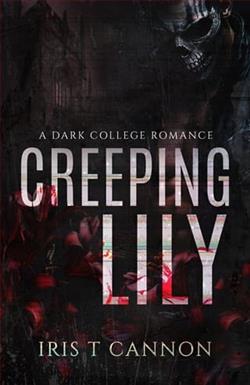Page 37 of Jailer to the Death God
I can’t spend too long in this place.
I land near the Furnace of Souls, listening to its familiar roar, watching the scenes of each completed life dance across the veil of fire.
Firmly I place one palm against the stone side of the arch, to infuse the furnace afresh with my will and my power. Touching it like this also enables me to quickly read its recent activity. The images streak through my divine mind with a speed and complexity no human brain could grasp.
When it’s done, I fall back, breaking the contact and gasping at the overwhelming force of the images. My head spins, and nausea pulses in my stomach.
I’m not myself.
“Macha,” I growl. “What have you done to me?”
I could push the question into the ether, have it resonate with divine force. She would hear me, and she might answer. But then I’d be drawing her attention to the fact that I’ve been bound—and not only bound, but trapped and weakened by the additional parameters she placed upon the ritual.
I’ve seen two other volumes with my summoning ritual in them. Neither of them had those extra lines in Macha’s handwriting. The script resonated with godly power—fresh power—which means the addendum is newer than the rest of the spell. How is that possible, attaching a new condition onto an ancient rite? And why would Macha do it?
A foolish question, I suppose. She is the goddess of war and conflict, after all. When she’s bored, she either fuels existing dissension or creates a conflict where there is none.
I stride away from the furnace, tucking two fingers into my mouth and issuing the piercing whistle that will summon my hounds.
From the souls passing into the furnace, I sometimes learn of humans who are still alive, committing particularly egregious sins. To some of those humans, I send the hounds as a warning to change their ways. To others, the appearance of my hounds is an immediate death sentence. My beasts drag their victim to the nearest pit and bring him down to me, where he becomes a new addition to the pack. I am admittedly fickle in my choice of whom to punish with this irreversible doom, but I am a god, after all. I have fewer vagaries than others of my kind, and at least this one is helpful to mortals.
Farther I walk, into fields of dark green grass, beside blackthorn thickets and hollows filled with bones, past tumbled piles of skulls that leak the curling mists of bittersweet memory into the air.
Finally, across the hills in the distance, I see my hounds coming, bounding on crooked legs, their eye sockets and panting tongues streaming with orange fire. In the beginning I had eleven of them, but the number has grown over the years as I found more despicable souls who deserved special punishment.
The original eleven are still the most powerful, towering over the others. Over time they have developed unique traits. One is wrapped in twisting thorns, which can lash out from his body like whips. Another has shed the fur and flesh of his head, until only a canid skull remains. Another grew a tail like a scorpion, and a third has replaced his front paws with the yellow pronged feet of an enormous chicken.
My summons wasn’t for the whole pack, but for these eleven—the leaders. As the oldest and most powerful, they are also the most volatile. They have rebelled against me before, in small ways and unsuccessfully. Still, I need to be sure they remain completely under my control, or they could decide to enter the mortal plane and wreak unimaginable havoc.
They’re answering my call—racing toward me, all eleven of them.
But my nerves tighten with apprehension when I realize they’re not alone.
A twelfth figure is with them.
17
After the announcement of the dinner, the Council lets me go—reluctantly. I bring the dazed Chief Manager with me into the royal study and apologize profusely for putting him in that position.
“I can’t help it, you see,” I whisper to him earnestly. “They’re going to make me marry someone. Someone important—a noble, one of the high-ranking merchants, or one of our military leaders. I just need one night where I can meet them all and decide which one might be the most bearable.”
“Marriage,” gasps the Chief Manager. “This means there will be an engagement ball to plan for, too—and a wedding—”
“No.” I take the papers from his hands and set them aside. “No, there won’t be any parties or celebrations, and the wedding will be a small one. It would be in poor taste to do otherwise. I know we’re understaffed already, and the stores have dwindled, and the pantries are bare—” My voice hitches, and I pause to breathe, tobreathe. “Trust me, if there were any way to avoid this, I would. I—I suppose I could simply agree to marry Venniroth, and then there would be no need for—”
“Nonsense.” The Chief Manager squares his shoulders. His uniform is wrinkled, its cuffs shiny from wear, and his chin is unshaven; but a hint of his once-proud manner returns to him for a moment. “You may have to give up the beautiful wedding you deserve, but by the gods, youwillhave a choice in whom you marry. Your father would have wanted that for you, and your mother too, Arawn bless her soul.”
His use of the death god’s name startles me for a moment; it’s strange to hear it used in a blessing, now that I’ve come to know the god himself.
“I’ll speak to the cooks and the servants,” says the Chief Manager. “We will find some way to make a decent dinner with a few decorations. And I’ll try to find a few musicians who have survived the plague, whose talent is worthy to grace these halls.”
“Whatever you can do will be more than satisfactory,” I assure him. “Thank you.”
I rush through several more tasks before returning to my room and changing for Rose’s funeral. When I arrive at the temple, I discover that Rose’s family invited Leilani’s last living relatives, her uncle and cousins, to set up a memorial shrine for Lei right next to Rose’s silk-draped body.
At the sight, I nearly break again.
But I manage to hold myself together throughout the homily of remembrance, the slow chants of farewell, and the lighting of the incense. I survive the recitation of favorite memories by the dead women’s relatives. I even manage to rise, and walk to the front of the temple sanctum, and deliver a couple verses of a poem that Rose, Lei, and I loved.















